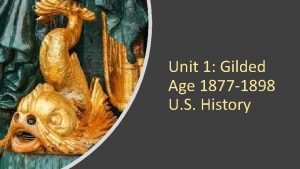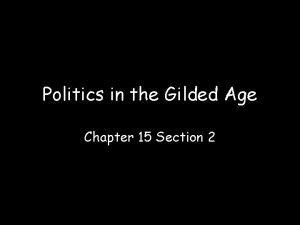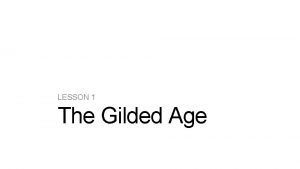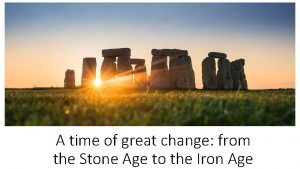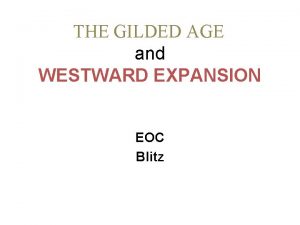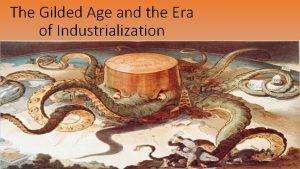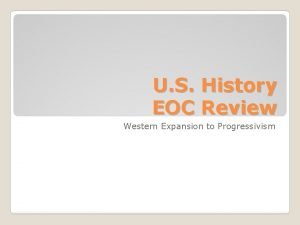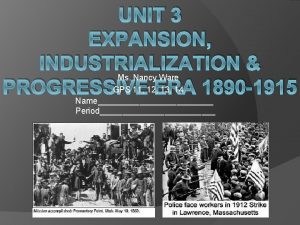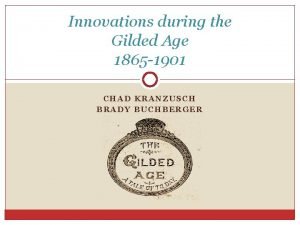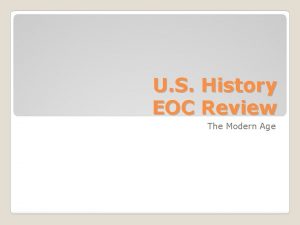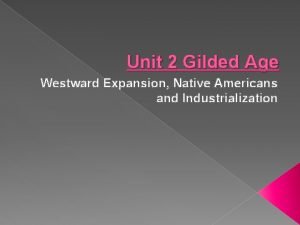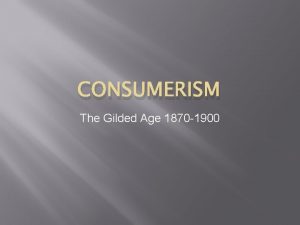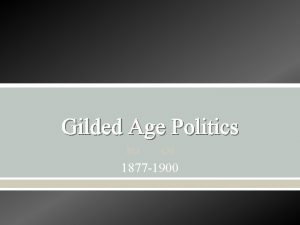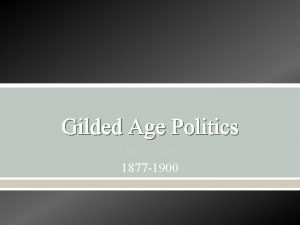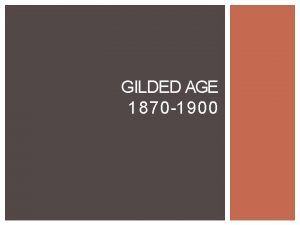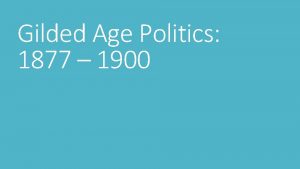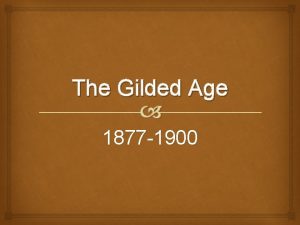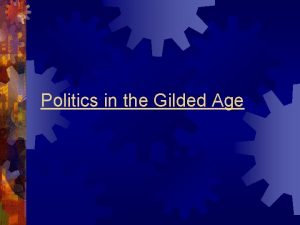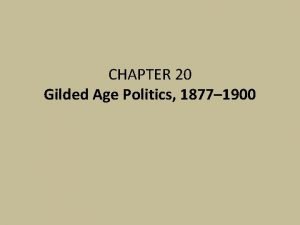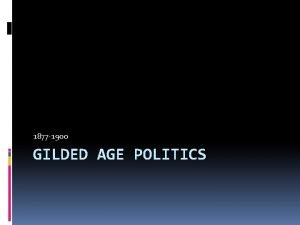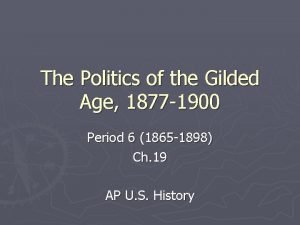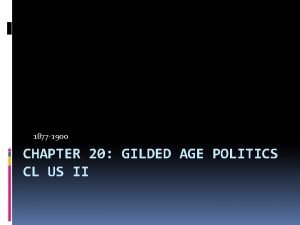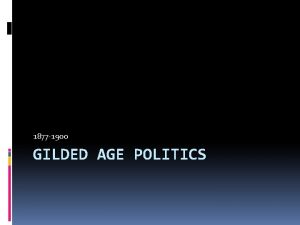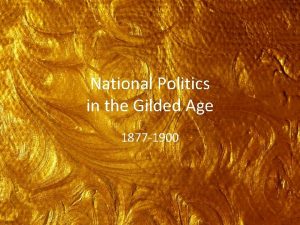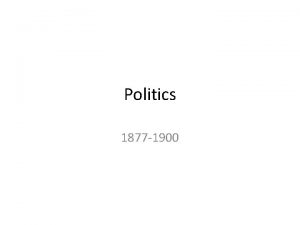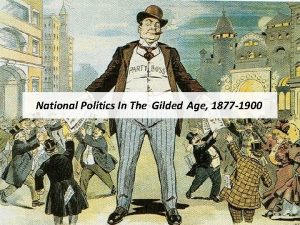Gilded Age Politics 1877 1900 The Gilded Age
















- Slides: 16

Gilded Age Politics 1877 -1900

The Gilded Age Name comes from the title of an 1873 Mark Twain book o Referred to the “superficial glitter” of the new wealth that developed in the late 1800 s Dominated by a belief in limited government, laissez-faire economics, & Social Darwinism Marked by political corruption & ineffectiveness

Gilded Age Politics Era was most highly competitive politically in US history o Voter turnout reached highest levels in US history o Parties avoided controversial issues that might alienate voters o Led to issue-free campaigns focused on party loyalty & regional, religious, & ethnic ties

Political Parties Republican Party Stressed strict codes of personal morality and government’s involvement in regulating both economic & moral affairs of the community as a whole Consisted of businessmen & African Americans Support from Midwest & small & rural towns in northeast Democratic Party Opposed government efforts to impose a single moral standard on society Emphasized economic equity Consisted of many immigrant German Lutherans & Catholics (especially Irish) Support from the Solid South & large industrial cities where immigrants factored in significantly under political machines

Political Corruption Political Machines: Tightly organized groups of politicians that controlled the political parties in urban areas o Headed by a “boss” o Provided services to business, immigrants, & the poor in exchange for votes on election day o Exemplified by “Boss” William Tweed of the Tammany Hall machine (Tweed Ring) in NY city

Political Corruption Politics focused on winning and holding office, not on issues or legislation Led to an increase in patronage, i. e. giving away government offices for votes, kickbacks, & party service o Government employment expanded significantly (e. g. postal service) o Reformers targeted spoils system as being inefficient & corrupt

Republican Factions Stalwarts, Half-Breeds, and Mugwumps o Stalwarts: Led by Roscoe Conkling, Senator who favored spoils system o Half-Breeds: Led by James G. Blaine, Congressman who favored civil service reform o Mugwumps: Represented in thought by Thomas Nast • Made up of young liberal reformers • Favored Reconstruction policies to help African Americans • Anti-corruption

Gilded Age Presidents Rutherford B Hayes (1877 -1880) Republican Elected as a result of the Compromise of 1877; ended Reconstruction Attempted to reestablish honest government after Grant Supported temperance Vetoed efforts to restrict Chinese immigration

Gilded Age Presidents James Garfield (1881) Republican – Half-Breed Appointed most patronage jobs to Half-Breeds; angered Conkling & the Stalwarts Assassinated by a deranged Stalwart office seeker in 1881 Became a martyr in a corrupt civil service system —spurred public demand for reform

Gilded Age Presidents Chester A Arthur (1881 -1885) Republican – Stalwart Became president when Garfield died Supported civil service reform Signed the Pendleton Act (1883) o Prohibited hiring office holders based on wealth o Established a merit system for making appointments o Set up Civil Service Commission to give open competitive examinations to applicants o Forced politicians to look to corporations for campaign funds

Election of 1884 Republicans – James Blaine Democrats – Grover Cleveland Campaign o Republicans publicized Cleveland’s claim of having an illegitimate child o A NY Republican clergyman labeled the Democrats as the party of “Rum, Romanism, and Rebellion” • Insulted NY’s Irish community • Blaine failed to repudiate the statement • The nativist phrase ultimately cost Blaine crucial NY

Election of 1884

Cleveland’s Presidency First Democrat in 28 years Staunch believer in laissez faire economics Believed in the merit system, but eventually replaced Republicans with “deserving Democrats” Vetoed farm assistance – “Though the people support the government, the government should not support the people. ” Vetoed pension bills Supported a lower tariff First real issue that divided the Democrats & Republicans Would end a treasury surplus Meant lower prices for consumers and less protection for monopolies

Election of 1888

Benjamin Harrison’s Presidency Reversed most of Cleveland’s policies Sherman Silver Purchase Act Mc. Kinley Tariff Act o Raised tariffs to highest peacetime level: 48% o Damaged farmers who voted the Republicans out in the next election

Benjamin Harrison’s Presidency
 The gilded age 1877 to 1898 worksheet answers
The gilded age 1877 to 1898 worksheet answers Pendleton civil service act
Pendleton civil service act The tournament of today
The tournament of today Politics in the gilded age chapter 7 section 3
Politics in the gilded age chapter 7 section 3 Pallid politics in the gilded age
Pallid politics in the gilded age Stone age chronology
Stone age chronology Iron age bronze age stone age timeline
Iron age bronze age stone age timeline Gained voter support by helping immigrants find jobs.
Gained voter support by helping immigrants find jobs. Vertical integration gilded age
Vertical integration gilded age Gilded age eoc blitz review
Gilded age eoc blitz review Promontory point gilded age definition
Promontory point gilded age definition Gilded age graphic organizer
Gilded age graphic organizer Chapter 23 political paralysis in the gilded age
Chapter 23 political paralysis in the gilded age Gilded age innovations
Gilded age innovations Gilded age eoc blitz review
Gilded age eoc blitz review Gilded age acrostic poem
Gilded age acrostic poem Consumerism in the gilded age
Consumerism in the gilded age
